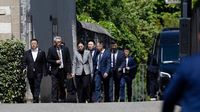On May 11, 2025, Defence Minister Rajnath Singh is set to inaugurate the BrahMos Aerospace Integration and Testing Facility in Lucknow, a significant milestone for India's defense sector. The inauguration, scheduled for around 11 am, marks a crucial step in enhancing India's defense capabilities. This facility, part of a broader initiative, was preceded by the laying of the foundation stone for the Defence Technology & Test Centre and the BRAHMOS Manufacturing Centre back on December 26, 2021. The Defence Technologies & Test Centre (DTTC) spans approximately 22 acres and aims to accelerate the growth of the defense and aerospace manufacturing clusters within the Uttar Pradesh Defence Industrial Corridor (UP DIC).
Meanwhile, global tensions continue to escalate, particularly in the Middle East. At least 21 people, including several children, were reported killed on Saturday, May 10, 2025, in Israeli airstrikes on the Gaza Strip, as reported by Al Jazeera. The attacks have exacerbated the humanitarian crisis in the region, which has been under a prolonged Israeli blockade. Specifically, four Palestinians were killed when an Israeli airstrike targeted a tent sheltering displaced families in Deir al-Balah, while earlier that day, five members of the Tlaib family lost their lives in a bombing of a tent in Gaza City.
In a separate development, U.S. and Chinese officials engaged in extensive tariff negotiations in Switzerland, which continued on May 11, 2025. Treasury Secretary Scott Bessent and Chinese Vice Premier He Lifeng met for over 10 hours in discussions that could potentially stabilize the global economy amid ongoing trade tensions. President Donald Trump expressed optimism about the talks, stating on his Truth Social platform that "great progress" was being made and suggested a "total reset" of U.S.-China trade relations. However, no major breakthroughs were reported from the initial discussions.
Trump's comments came after he raised U.S. tariffs on China to a staggering 145%, prompting a retaliatory 125% tariff on American imports from China. He indicated that an 80% tariff on Chinese goods "seems right" and emphasized the need for China to open its markets to American businesses. The talks, which have been characterized by secrecy, aim to address the economic ramifications of the tariffs, which have disrupted trade exceeding $660 billion annually.
Back in India, tensions between India and Pakistan have led to heightened security measures in Amritsar. On May 11, 2025, the Amritsar District Collector issued a red alert, urging residents to remain indoors. This alert followed reports of increased military activity and violations of ceasefire agreements along the border. The District Collector advised residents to keep lights off and avoid approaching windows, emphasizing the importance of compliance and calm.
Earlier, India accused Pakistan of violating an understanding reached between the Directors General of Military Operations (DGMOs) of both countries regarding a cessation of military actions. India’s Foreign Secretary Vikram Misri stated that the Indian Army is responding decisively to these violations, maintaining a strong vigil along the International Border and the Line of Control.
Despite the escalating tensions, operations at Delhi International Airport (DIAL) remain normal, although passengers have been advised to stay updated on potential delays due to heightened security protocols. A travel advisory issued by DIAL cautioned travelers to arrive early and comply with security measures, reflecting the evolving airspace dynamics amid the regional unrest.
In the context of the ongoing conflict, reports surfaced that Indian strikes targeted four airbases in Pakistan in response to attacks on various locations across India. This retaliatory action signifies a significant escalation in military confrontations between the two nations.
On the international front, Russian President Vladimir Putin has proposed direct talks with Ukraine in Istanbul on May 15, 2025, following calls from European leaders for a ceasefire. Putin expressed a desire for serious negotiations to address the root causes of the conflict, indicating a potential shift in diplomatic efforts amidst ongoing hostilities.
In summary, the geopolitical landscape remains fraught with tensions as nations navigate complex military, economic, and diplomatic challenges. The inauguration of the BrahMos facility symbolizes India's commitment to bolstering its defense capabilities, while the U.S.-China tariff talks reflect the ongoing struggle for economic stability in a rapidly changing global environment. As events unfold, the international community watches closely, hoping for resolutions that prioritize peace and cooperation.

